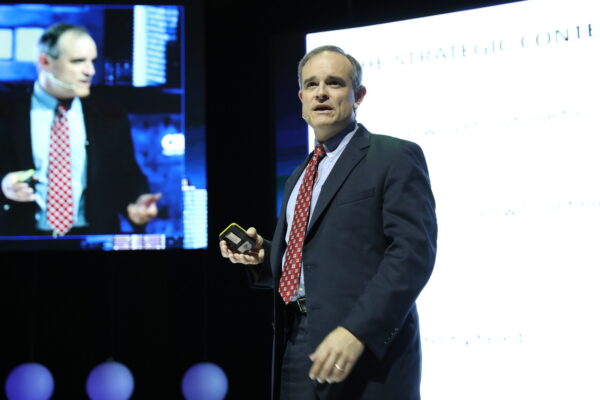Sponsored by Monday Properties and written by ARLnow, Startup Monday is a weekly column that profiles Arlington-based startups, founders, and other local technology news. Monday Properties is proudly featuring 1515 Wilson Blvd in Rosslyn.
Cybercriminals are not the stereotypical teen in their mom’s basement wearing a hoodie.
Cyber crime has become a highly organized business, with people specialized in different parts of the process, nonprofit Cyber Threat Alliance President and CEO Michael Daniel said. And cyber threats, such as ransomware, have exploded as people are more connected to the internet and can move money more easily.
“We’ve entered a stage where cyber crime poses a very significant threat to the global economy and the global system, equivalent to what normally would only be associated with nation-states,” Daniel said. “And so that’s a big challenge and a big change.”
Based in Clarendon, Cyber Threat Alliance enables cybersecurity companies to share threat information with each other quickly to prevent and respond to these attacks.
“No individual company has a complete view of what’s going on in cyberspace, so in order to be able to protect your customers, or work with the government, law enforcement agencies or others to help disrupt the bad guys, you need more information,” Daniel said.

People who work in cybersecurity policy talk about information sharing a lot, but there wasn’t anyone dedicated to it for the industry until the nonprofit was formed five years ago with its six founding members — Palo Alto, Fortinet, Check Point, Cisco, McAfee and Symantec.
“The leaders of those companies really understood that talking about information sharing in cybersecurity, well, everybody talks about it, but it’s hard to do,” said Daniel, who worked in federal government for 20 years, including as former President Barack Obama’s cybersecurity adviser.
As for locating in Arlington, where Daniel and his wife had settled, the decision was simple.
“This is a great place for getting started and working in the cybersecurity industry because the Washington, D.C. area is the hub for policy and other kinds of development,” he said. “And this is really home for us. It’s not really more complex than that.”
Now, CTA has 34 member companies, which are required to share a minimum amount of threat intelligence each week, and employs seven people. Its members are headquartered in 11 countries around the world and run the gamut of household company names, like Cisco, to relatively smaller cybersecurity companies.
There’s a list of companies in the pipeline to become members, which opens up possibilities for hiring additional staff and offering more services, Daniel said.
In the upcoming year, CTA hopes to add technological capability to its sharing platform and is involved in projects, including one with the World Economic Forum’s Centre for Cybersecurity to understand the criminal ecosystem so it can support government action against cybercriminals.
“Ransomware is a huge problem, cyber crime is a big problem, and it’s something we need to really tackle if we want people to be able to use the digital world in the way that we want,” he said. “Cyber threats are not a problem that we’re going to solve but it’s a problem that we’re going to have to manage. We are building for the long term.”


